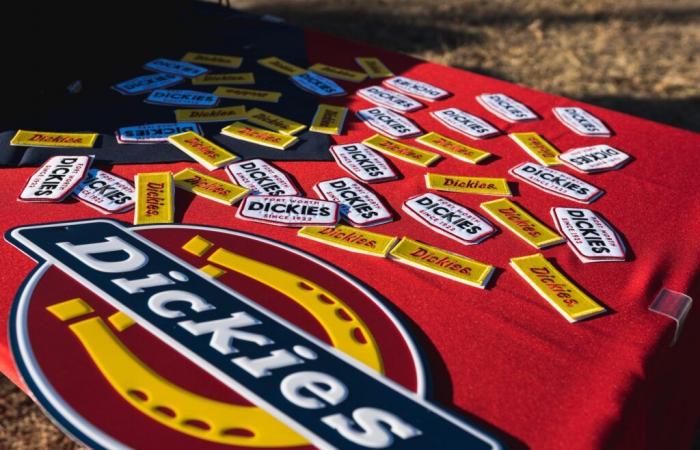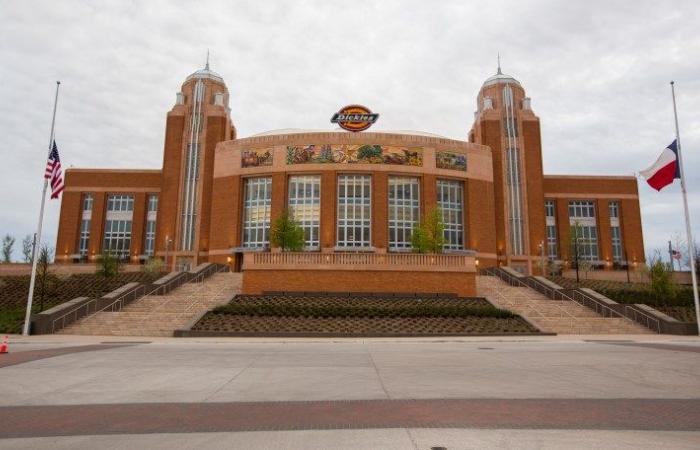Longtime Fort Worth workwear brand Dickies will relocate its headquarters to Costa Mesa, California.
VF Corp., the company that acquired Dickies in 2017, confirmed the move in an email to the Fort Worth Report.
“VF has decided that it will be relocating the Dickies brand’s headquarters from Fort Worth, Texas, to an existing brand campus the company maintains in Costa Mesa, California,” said Ashley McCormack, director of external communications for VF Corp. “This move allows VF to further consolidate its U.S. real estate portfolio as part of its stated business turnaround strategy.
“While this was a tough call, we are confident this change will help us revitalize Dickies so we can carry on the brand’s heritage for years to come.”
The move will affect about 120 employees, according to a VF Corp. spokesperson. It will be complete in May 2025.
Dickies will continue to have employees in the area at its Fort Worth distribution facility, as well as the warehouse and stores in the area.
In a statement, the city said its leadership “is aware of the proposed move of Dickies’ headquarters as a result of a corporate consolidation by VF Corporation.”
“Dickies has been on the job in Fort Worth for more than a century,” according to the statement. “The company is a true Texas original — everything from its iconic, internationally-known workwear to its local legacy reflects the spirit of Fort Worth and what our city will always stand for. These qualities were undoubtedly part of what made Dickies such an attractive brand to VFC, spurring their 2017 acquisition, and Dickies is just one example of the kind of success stories that businesses find here in Fort Worth.”
Mayor Mattie Parker called Dickies a Fort Worth success story.
“Great success stories have their roots in Fort Worth and Dickies is just one example,” Parker said in a statement. “While we understand companies are sometimes forced to make difficult budget decisions under new leadership, we think VFC will find — as others have — that Fort Worth, Texas is ultimately a more competitive place to do business.”
Robert Allen, president and CEO of the Fort Worth Economic Development Partnership, said change is always a part of business, and that Fort Worth wishes them well.
“It’s worth noting that since 2005, more than 230 companies have left California and more than half of them have relocated to Texas,” Allen said in a statement. “VF Corp. has made its choice, but it goes against the trend of the massive amounts of companies heading to Texas. And we in Fort Worth continue to experience exponential growth with the recent announcements of Siemens, DrinkPAK, Embraer, the creation of Texas A&M-Fort Worth, and the expansion of UTA West.”
Dickies was established in Fort Worth in 1922. After decades at its West Vickery Boulevard location, the manufacturer moved downtown last year. The company leased about 84,000 square feet on the top floor of The Tower complex at 500 Taylor St. That suite has a market value of $609,517, according to records from the Tarrant Appraisal District.
District 9 City Council member Elizabeth Beck, who represents the area of downtown Fort Worth where Dickies currently headquarters, said the impact of the company’s departure is significant.
“Their contributions to our city’s culture, economy and identity are immeasurable,” Beck wrote in a statement. “While we understand their business decision, it is bittersweet to see a company that started right here in Fort Worth take this next step. We are committed to supporting the employees who remain here and will work to honor the lasting imprint Dickies has left on our community.”
The brand emerged in 1918, when founding business partners C.N. Williamson and E.E. “Colonel” Dickie launched a vehicle and harness business, creating equipment for horses. Four years later, the company shifted its business strategy to create durable denim bib overalls for ranchers and other farm workers.
The change was good for business and the company began to grow.
During the Great Depression in the 1930s, Dickies expanded its workforce and output by offering all-you-can-eat meals free to workers on the production line.
In World War II, the company was sequestered by the U.S. government for military uniform production, halting its consumer business.
The brand resurfaced to consumers post-war and gained an international following when Texas oilmen introduced the denim overalls to Middle East oil fields in the 1950s.
“As the Dickies name spread around the world, it became synonymous with the type of rugged Texas lifestyle from which it was born,” the company said in its history.
The brand expanded in the late 1960s to include the signature 874 twill work pants that the company said were “considered practically indestructible.” That item became a bestseller and remains a popular apparel item.
The iconic work pants became a fashion favorite during the rise of hip-hop and skateboard culture in the 1980s, when its reputation revolved around durability and toughness. During the 1990s and beyond the brand became a high-fashion staple among trendsetters and influencers, a popularity that took it to big city runways around the world.
The company celebrated its 100-year anniversary in 2022. The anniversary also saw the workwear company celebrated in Vogue Business. This year, GQ magazine named the brand as must-have clothing.
“The world became their playground, and Dickies became their pant of choice,” the company said.
But while the thread that ran through the company’s aesthetic remained recognizably durable workwear, ownership changed hands in 2017. That was the year Williamson-Dickie Manufacturing Co. was purchased for $820 million by VF Corp., the parent company of notable brands such as Vans, The North Face and Timberland.
Dickies continues to have a strong presence in Fort Worth. The city’s largest arena bears its name, thanks to a naming rights agreement approved in 2017, the revenue from which goes toward operations, maintenance and capital improvements. The terms of the agreement were not disclosed.
Matt Homan, president and general manager of Trail Drive Management Corporation, the organization behind the development of Dickies Arena, said the relocation won’t have any impact on the arena.
“We’re just grateful for everything the Williamson family and the Dickie family has done for Fort Worth,” Homan said. “Obviously we are sad to hear this news.”
The Dickies Skate Plaza in the Near Southside is also named for the company. The VF Foundation, the philanthropic branch of Dickies’ parent company, VF Corp., donated $300,000 for the construction of the plaza and park.
(Rodger Mallison | Fort Worth Report)
Philip Williamson, the fourth generation of Williamsons to lead the company, remains active in the city. He was formerly chairman, president and CEO of Williamson-Dickie Mfg. until the company was sold to VF Corp. He is currently brand ambassador for Dickies and was recently named chairman of the Southwestern Exposition and Livestock Show, the organization behind the Fort Worth Stock Show & Rodeo.
In recent years, VF Corp. has seen revenues decline. VF is currently revamping its business model under the leadership of CEO Bracken Darrell, who was appointed in 2023. VF Corp. has been selling non-core businesses, including streetwear brand Supreme for $1.5 billion in July after acquiring the label for $2.1 billion in 2020.
In its second quarter earnings results, posted in late October, VF said its revenue reached $2.8 billion, down 6% from last year’s results. The company said sales of its North Face and Vans brands were down 3% and 11% respectively compared to last year.
For fiscal year 2025, VF said it expects free cash flow from continuing operations plus proceeds from non-core physical asset sales that are expected to garner $425 million.
Appraisal district records show the company owns two other properties in Tarrant County, including one $223.8 million distribution center at 9400 Blue Mound Road and another $1.9 million center at 201 Intermodal Parkway in Haslet.
Bob Francis is business editor for the Fort Worth Report. Contact him at [email protected]. Eric E. Garcia is a senior business reporter at the Fort Worth Report. Contact him at [email protected]. Emily Wolf is the local government accountability reporter for the Fort Worth Report. Contact her at [email protected]
At the Fort Worth Report, news decisions are made independently of our board members and financial supporters. Read more about our editorial independence policy here.








